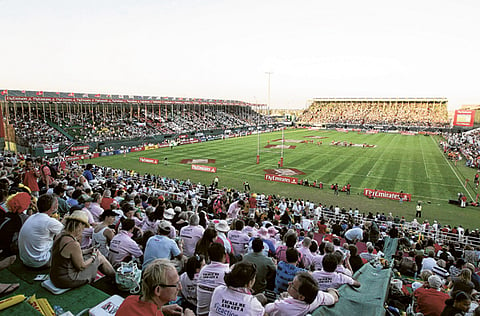Mark Egan: Rugby has evolved and grown
IRB official says there are no shortcuts for development of the sport in the Gulf

Dubai: At the end of this month, the Arabian Gulf Rugby Football Union (AGRFU) — the sole authority for the sport in the Gulf region — will be disbanded as per a new ruling that mandates autonomous governing bodies for each country, rather than zones or regions.
This is a historic occasion in more ways than one as each of the Gulf states will be needed to set up and establish their own committees and oversee the growth of rugby in the region.
A major part for this shift in stance has been due to the impending decision to make rugby an Olympic sport starting with Rio de Janeiro in 2016. The International Rugby Board (IRB) has backed its member nations, goading them on to start grass-roots development of the sport, as Mark Egan, the IRB's Head of Development and Performance tells Gulf News:
GULF NEWS: Mark, if you take a look around and try to ascertain the development factor of rugby, where would you say you are at the moment?
MARK EGAN: Honestly, it's a great time for rugby. We have the World Cup in 2011 [in New Zealand], which we are convinced will be a great event and a special experience for rugby fans. We are convinced New Zealand will do a great job hosting that competition, and the rugby on the pitch will be very exciting. Countries like the US, Canada, Georgia are going to be competitive. Then there is the close coordination of working with the International Olympic Committee (IOC) and getting ready for 2016 in Rio de Janeiro, asking governments and sports agencies to get involved in our sports, schools wanting to have rugby on their curriculums all around the world. These are all exciting times. And then there are the 125th anniversary celebrations of the IRB which are going to be challenging as well.
Rio de Janeiro must be an exciting time with rugby making an appearance. But what exactly are plans for London 2012?
We ought to make sure that this moves towards the goals that we have set towards having a rugby competition at the London 2012 Games. We need to get all this sorted out and in good time. And definitely to have rugby in London will see very exciting times for rugby.
What are targets for the sport?
There is a very holistic plan for rugby and its growth. And it is not just about the HSBC Series or the Sevens Series, but rather developing the game right from the grass-roots level to the biggest level.
We have got strategies in there to see how we are going to achieve the growth of the game. We've got to grow the numbers from the current 3.5 million to 6 million by 2020 and the sevens will definitely help us achieve that. We have to work with our member unions and be sure we work closely with the National Olympic Committees (NOCs) in all our member nations.
There is funding available through the NOCs and we have to make sure our association gets access to that money so that the sport grows in the world. It's an all encompassing plan to develop the sport.
Is it something similar to what has happened with cricket?
No, I don't think we are in a similar position to that of cricket. There are good lessons to be learnt from the 20-20 cricket scenario. We have always had sevens since so many years now.
It's not like a new version of the sport that just came on the scene [like the 20-20 cricket]. It's important that we manage and control the growth that we can achieve and we do that through our member unions and the IRB council for improving country formats.
One of the key things we are looking at is the international calendar. To see where the HSBC calendar fits in and where the various continental competitions fit in. We are now developing a competition model. This will be a well co-ordinated effort by us.
What sort of role do you think the AGRFU played in the region?
The AGRFU came in at a time when our number was small. Over the past few years we have evolved and grown. We have followed best governance policies around the IOC model and the AGRFU people have done a fantastic job in growing the game here.
That will still be there as a legacy and the people involved in the game need to continue doing so, so that the growth can continue. And the individual countries can now set up their own associations.
What sort of progress has been made by Gulf countries in this direction?
The associations have responded pretty well. We have been working closely with the NOC and the UAE Rugby Association.
We are taking a step-by-step approach and the area has a new approach as people will now have to do certain things by themselves instead of having the AGRFU doing things for them.
We are helping in this area. We have a full-time person here [Matt Oakley], who will be working with all the federations in helping.
What progress do you foresee?
Let it be known that there are no shortcuts here. The UAE nationals are involved, and have to be involved in the sport. Luckily for us, they have been very open with the development strategies, very open to meeting various people and trying to draw on their knowledge. It's important that we continue working in this direction so that once the time passes by then there will be a full structure in place.


